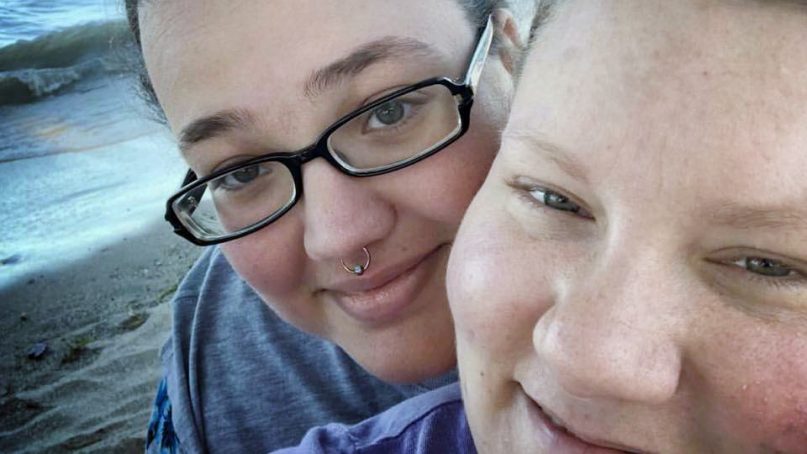(RNS) — Four years after Indiana adopted its Religious Freedom Restoration Act, prompting boycotts, bad press and an eventual amendment to avoid approving anti-LGBT discrimination, the state briefly returned last month to the debate when a tax preparer in rural Russiaville, Nancy Fivecoate, declined on religious grounds to prepare a return for a same-sex married couple.
Samantha Brazzel, whose wife, Bailey’s, returns had been prepared by Fivecoate before the couple was married, told The Washington Post that the couple left Carter Tax Service feeling “shocked, upset, and kind of hurt.” They shared their ordeal in a local Facebook group before it was picked up by local media.
Fivecoate told an NBC affiliate, “I am a Christian and I believe marriage is between one man and one woman.” She added, “I was very respectful to them. I told them where I thought she might be able to get her taxes prepared.”
But the story made barely a ripple in the national culture war for one happy reason: No serious religious freedom advocate stepped forward to defend Fivecoate. Conservative legal-defense groups such as Alliance Defending Freedom and the Becket Fund, which often rush to represent people with religious liberty claims, have said nothing about this story.
Is it too much to hope that the kerfuffle is a sign of a promising consensus against giving credence to baseless, purely discriminatory claims?
To answer that, we need first to agree that Fivecoate’s misguided insistence that her religious beliefs relieved her from having to assist Samantha and Bailey Brazzel almost certainly stems from the righteous ballyhoo on both sides after then Indiana Gov. Mike Pence signed the RFRA in 2015. The tax preparer likely felt further justified by Masterpiece Cakeshop, Ltd. v. Colorado Civil Rights Commission, the Supreme Court case decided last summer giving Lakewood, Colo., baker Jack Phillips the right to refuse to make a wedding cake for two men.

Baker Jack Phillips, owner of Masterpiece Cakeshop, manages his shop on June 4, 2018, in Lakewood, Colo. The U.S. Supreme Court ruled that he could refuse to make a wedding cake for a same-sex couple because his religious beliefs did not violate Colorado’s anti-discrimination law. (AP Photo/David Zalubowski)
Progressive opponents said then that carve-outs for wedding vendors and other kinds of businesses amount to a license to discriminate. That’s not as likely as what has happened in Indiana: that some conservative Christians, like Fivecoate, may now be primed to deny business services by default.
That’s not only a shame, it undermines the argument of people with potentially more legitimate claims — caterers, bakers, printers and other creatives whose artistic expression would be put in direct service of a ritual they don’t support.
It’s true that the line is not always clear between legitimate religious conscience claims and discrimination (that’s why religious freedom cases go all the way to the Supreme Court). But Fivecoate has no legitimate religious liberty defense. Filing a tax form is a public accommodation. If she has such strong beliefs about the sinfulness of unions outside of heterosexual marriage, Fivecoate would have to show a history of declining her services to all manner of what she would consider sexual sinners, which she makes no pretense to have done.
Having won their case in Washington, conservative leaders should perhaps do more to help people distinguish those situations. But it’s a start for them to show that there is indeed a principle at play in these cases and not a blanket defense of anti-gay animus. It’s a credit to traditionalist religious liberty advocates that there is a limit to their support.
Let us equally commend the Brazzels, who were clearly wronged in this episode. Bailey and Samantha reacted with shock and sadness, as anyone would. They expressed their hurt in a public forum. They raised awareness. And then they moved on, finding someone else to prepare their tax return.
The couple may be simply facing up to the fact that Indiana has no state law prohibiting discrimination on the basis of sexual orientation. Where such laws do exist, plaintiffs and state civil rights commissions have sought punitive actions against business owners who declined service to LGBT customers.
But their response is a far cry from some other LGBT litigants, who have alleged that being on the receiving end of a service denial is a traumatizing assault on their dignity as a person, for which the only redress is to financially ruin a small-business owner. “We don’t wish any harm to her or her business, nor do we think she’s terrible,” said Samantha of Fivecoate.
A free society will continue to navigate tensions between LGBT people’s rights and those of religious traditionalists, so each may live in accordance with their beliefs about marriage, sexuality, and gender identity.
The latest Indiana episode was not a big deal because the tax preparer’s religious freedom was not infringed upon and because the wronged couple was gracious. And that’s something we can be thankful for April 15 and every day.





